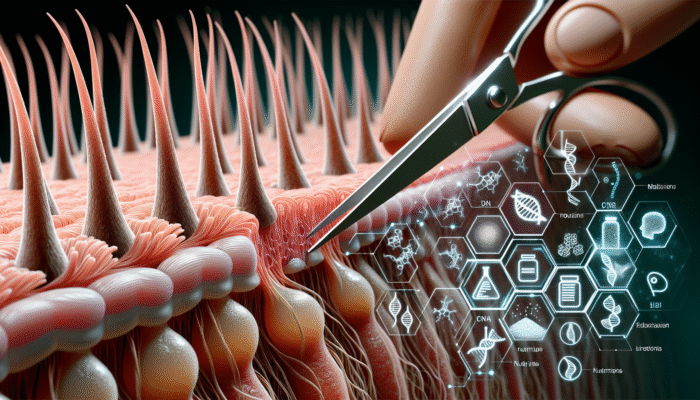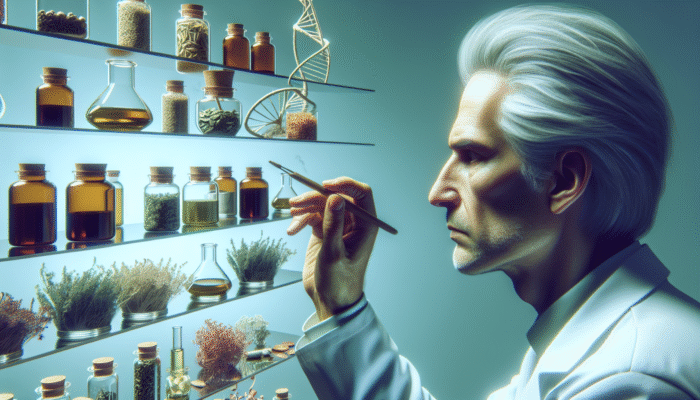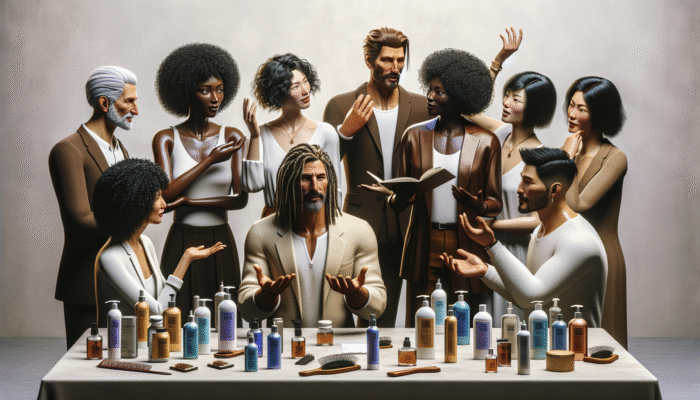Clearing Up Myths About Hair Treatments for Better Understanding
Understanding the Biology: Can Cutting Hair Actually Enhance Growth Rates?

The widely held belief that cutting hair accelerates its growth has taken root within the beauty industry, influencing countless individuals. However, a closer look at the biological processes underlying hair growth reveals a more complex truth. The actual expansion of hair occurs at the level of hair follicles, which are shaped by a multitude of factors, including one’s genetics, overall health, and hormonal balance. Ultimately, the pace at which hair grows is primarily dictated by genetic predispositions and nutritional intake. Thus, the simple act of trimming hair does not modify the underlying dynamics of the hair follicles that govern the speed of hair growth.
People often confuse the visual effects of a fresh cut with an increase in growth rate. After trimming, hair tends to look fuller and more vibrant because split ends are removed, creating the illusion of enhanced growth. This situation serves as a classic example of the confusion between correlation and causation; while the appearance of hair may seem revitalised, its actual growth rate is unchanged. This temporary boost in volume can significantly uplift one’s self-esteem, reinforcing the misconception that hair experiences a surge in growth following a trim.
To effectively promote the growth of healthier hair, individuals should consider implementing several practical strategies. Firstly, adopting a balanced diet, rich in essential vitamins and minerals, is of utmost importance. Nutrients such as biotin, omega-3 fatty acids, and proteins play a critical role in fostering growth from within. Moreover, prioritising scalp health through gentle massages and the use of appropriate hair care products can stimulate the follicles, creating optimal conditions for robust growth. Protecting hair from environmental stressors and minimising the use of excessive heat styling tools is also essential for maintaining its health and endurance.
Additionally, the psychological benefits associated with regular hair trimming can create a sense of rejuvenation, which contributes to a perception of healthier hair. This emotional uplift can boost self-esteem, allowing individuals to feel more confident about their appearance. Trimming hair can be seen as a proactive measure towards revitalising one’s look, hence reinforcing the belief that such practices positively impact hair growth. However, it’s important to recognise that while trimming helps maintain hair health, it does not directly influence the rate of growth or the thickness of hair, as affirmed by hair care professionals.
In essence, despite the prevalent myth that cutting hair stimulates its growth, it is vital to recognise that hair growth is largely governed by genetics, nutritional influences, and overall health. By concentrating on nutritional intake and scalp care, individuals can achieve significantly greater benefits for effective hair growth than relying solely on trimming.
Myth Busting: Does Frequent Hair Washing Lead to Hair Loss?
A common belief suggests that washing hair too often leads to hair loss, a misconception that has circulated in various circles. In truth, hair shedding is a normal aspect of the hair growth cycle, with an average person losing between 50 and 100 strands daily. This natural shedding occurs independently of how often one shampoos. Understanding this biological cycle is crucial in alleviating the anxiety associated with regular washing habits.
Shampooing is essential for maintaining scalp health and hygiene. Selecting the right shampoo can effectively remove dirt, excess oil, and product build-up, which, if left unattended, could lead to scalp issues and compromised hair health. It is vital to choose shampoos tailored to your specific hair type and any scalp conditions. For instance, individuals with oily hair may benefit from more frequent washes, whereas those with dry or curly hair might need to wash less often to preserve necessary oils. Opting for gentle, hydrating shampoos is key in maintaining hair health and ensuring the scalp remains nourished and balanced.
A plethora of studies have investigated the relationship between shampooing frequency and hair loss. Research published in the *Journal of Dermatology* has shown no significant connection between hair loss and the frequency of shampooing. This finding contradicts the traditional belief that frequent washing leads to increased shedding, reinforcing the understanding that genetics, hormonal fluctuations, and underlying medical conditions are the primary factors influencing hair loss.
For optimal hair health, it is advisable to select shampoos that are free from harsh chemicals such as sulfates and parabens, as these substances can lead to dryness and damage over time. Furthermore, using the right conditioner can help maintain moisture levels in the hair, thereby reducing the risk of breakage and enhancing its overall appearance. Striking a balance in washing frequency is essential; one should heed the needs of their hair and scalp rather than rigidly adhering to washing guidelines based on unfounded myths.
In summary, the belief that frequent shampooing causes hair loss is baseless. Prioritising scalp health, selecting appropriate products, and understanding the natural hair growth cycle are far more critical for preserving hair integrity than worrying about the frequency of washing.
The Truth About Brushing: Is Excessive Brushing Beneficial for Hair Health?
The idea that brushing hair 100 times a day promotes healthier strands is an outdated myth, originating from practices popularised during the Victorian era. Back then, it was widely accepted that excessive brushing could evenly distribute natural oils, resulting in a glossy appearance. However, this antiquated belief fails to reflect contemporary hair care knowledge and the potential damage caused by over-brushing.
In fact, over-brushing can be detrimental, particularly when hair is wet, as it is more vulnerable to breakage. Excessive brushing may lead to frayed strands, split ends, and an overall unhealthy look. The suitability of brushing frequency greatly depends on different hair types. For instance, individuals with fine or delicate hair may require less frequent brushing to avoid damage, while those with thicker, coarser hair might be able to tolerate more brushing without significant adverse consequences.
Modern hair care specialists advocate for a more personalised approach to brushing. Rather than adhering to a strict number of strokes, individuals should focus on gentle detangling techniques that minimise breakage. Using a wide-tooth comb or a brush specifically designed for detangling can significantly lower the risk of damage, especially for those with curly or coily hair textures. Additionally, employing a leave-in conditioner or a detangling spray can enhance the brushing experience, providing a smoother process and offering protection against unnecessary stress on the hair.
Expert insights regarding the myth of excessive brushing reveal a consensus that customised hair care routines yield far superior results than following outdated practices. Dermatologists and trichologists stress the importance of understanding individual hair requirements, advocating against the one-size-fits-all approach of brushing 100 times. Instead, they recommend developing a brushing routine that nourishes the hair while safeguarding its overall health.
In conclusion, the belief that excessive brushing improves hair health is a misconception that overlooks the complexities of modern hair care. The most effective way to maintain healthy, vibrant hair involves practising mindful brushing habits tailored to individual hair types.
Examining the Myth: Can Grey Hair Be Naturally Reversed?

The belief that grey hair can be reversed using natural remedies is a prevalent myth that warrants careful examination. Grey hair results from a decrease in melanin production within hair follicles, driven primarily by genetics and the aging process. Unfortunately, there are currently no scientifically substantiated natural methods to reverse this biological change, and many claims surrounding supplements and home remedies lack credible scientific support.
Common misconceptions regarding grey hair often include the idea that stress has a significant role in its onset. While stress can lead to temporary hair loss, the direct correlation between stress and the greying process remains largely unsupported by scientific evidence. Research indicates that genetic factors have a more substantial influence on when and how quickly an individual experiences greying. Acknowledging this truth is essential for embracing the natural aging process and its accompanying changes.
For those facing the reality of grey hair, accepting this change can represent a positive step towards self-acceptance. Many hair care brands now offer products specifically formulated for grey hair, catering to its unique texture and needs. Such products can enhance the visual appeal of grey hair, providing styling options that celebrate rather than conceal silver strands. Embracing grey hair can also serve as a powerful expression of individuality and self-confidence.
While various nutritional supplements—such as vitamin B12 and folic acid—are often touted as potential remedies for reversing grey hair, evidence supporting their efficacy remains limited. Although these vitamins are vital for sustaining overall hair health, they do not directly influence melanin production. Therefore, managing expectations regarding the impact of dietary changes on the appearance of grey hair is crucial.
The psychological effects of greying can be significant, impacting self-esteem and mental well-being. Many individuals wrestle with societal beauty standards as they age. Recognising that going grey is a natural part of life can foster a healthier self-image and promote a more positive perspective on the aging journey.
To summarise, the notion that grey hair can be reversed through natural means is a myth lacking scientific validation. Embracing grey hair with proper care and a positive mindset can cultivate greater confidence and self-acceptance throughout the aging process.
Are All Natural Hair Care Products Truly Superior for Maintaining Hair Health?
Recently, the beauty industry has experienced a notable surge in the popularity of natural hair care products. However, the term “natural” can often be misleading. While many consumers assume that natural products are inherently better for hair health, it is crucial to scrutinise the ingredients and their potential effects, as some natural components can be harmful to hair.
The definition of “natural” in hair products can vary widely from one brand to another, and regulatory standards governing this classification are often inconsistent. Ingredients derived from nature are not automatically safe; for example, certain essential oils may trigger scalp irritation or cause allergic reactions. As a result, consumers must carefully examine product labels and understand the implications of the ingredients they apply to their hair. Focusing on the effectiveness of specific components—rather than solely their natural origin—can lead to more informed product choices.
When assessing hair care products, it is beneficial to take into account individual hair types and specific concerns. For example, individuals with curly hair may prefer products enriched with natural oils for added moisture, while those with fine hair might require lightweight formulations that do not weigh their hair down. The key lies in selecting products that address personal hair needs instead of merely following trends based on the allure of the “natural” label.
Additionally, numerous synthetic ingredients have been scientifically formulated to provide benefits that may not be achievable with natural alternatives. For instance, silicone, despite being synthetic, can offer excellent heat protection and smoothness, making it effective for various hair styling needs. Understanding the diverse functions of various ingredients and their performance can assist in making choices that prioritise hair health and desired results.
In conclusion, while the appeal of “natural” hair products is understandable, it is essential to approach this trend with a critical eye. Evaluating the ingredients and their suitability for your hair type is far more important than simply opting for products based on the perceived benefits of being “natural.”
Does Hair Dye Lead to Hair Loss: Separating Fact from Fiction?
The idea that hair dye is responsible for hair loss is a common concern among those who enjoy experimenting with different hair colours. While it is true that hair dye can potentially damage the hair shaft, it does not directly lead to hair loss. Understanding this distinction is essential for anyone looking to enhance their appearance through colour treatments.
Hair dye alters the natural structure of hair, which can lead to dryness and brittleness. This damage is often exacerbated when harsh chemical dyes or improper application techniques are employed. Nevertheless, the actual effect on hair loss is relatively minor. Strands may appear thinner or seem to fall out due to breakage, but this is distinctly different from the loss of hair follicles.
Adhering to safe hair dyeing practices is crucial to minimise potential damage caused by hair dye. This includes performing patch tests to prevent allergic reactions and using specially formulated products designed to reduce harm. Preparing the hair before dyeing, such as through deep conditioning treatments, can strengthen strands and make them less susceptible to the harsh effects of dye. Furthermore, considering alternative methods, such as semi-permanent dyes or natural options like henna, can be effective for achieving colour without exacerbating damage.
For those concerned about hair health while colouring, consulting a professional stylist can provide valuable insight into the best methods and products, ensuring that the dyeing process is both safe and effective. Regular trims can also help maintain hair integrity, reducing the appearance of damage and promoting healthier growth.
In summary, while hair dye can cause a degree of damage to the hair itself, it does not directly lead to hair loss. By employing safe dyeing techniques and making informed product choices, individuals can enjoy the aesthetic advantages of hair colour without compromising the overall health of their hair.
Frequently Asked Questions About Hair and Effective Hair Care Practices

Does trimming my hair influence its growth rate?
No, trimming hair does not impact its growth rate. Hair growth occurs at the follicle level and is primarily determined by genetics and overall health, rather than how frequently hair is cut.
Is washing my hair every day unhealthy for my hair?
Washing hair daily may not be necessary for everyone. It largely depends on hair type; those with oily hair may benefit from daily cleansing, while individuals with dry or curly hair might need less frequent washing to retain moisture levels.
How often should I brush my hair for optimal health benefits?
The frequency of brushing depends on hair type. Properly detangling once or twice daily is generally sufficient; excessive brushing should be avoided to prevent breakage and damage.
Can grey hair revert to its natural colour?
Currently, there are no scientifically validated methods to naturally reverse grey hair. Grey hair is the result of genetic factors and a reduction in melanin production.
Are natural hair products always the best choice for hair health?
Not necessarily. While natural products can offer benefits for hair, some natural ingredients may be harsh. It is crucial to evaluate ingredients based on individual hair types and specific needs.
Does hair dye contribute to thinning hair?
Hair dye can cause damage to the hair shaft, which may lead to breakage and the appearance of thinning hair. However, it does not directly result in hair loss from the follicles.
Are there specific foods that encourage hair growth?
Foods that are rich in vitamins A, C, D, E, zinc, iron, and omega-3 fatty acids support healthy hair growth. A balanced diet can significantly enhance overall hair health and stimulate growth.
Is stress a significant factor in the greying of hair?
While stress can lead to temporary hair loss, its direct connection to the greying of hair is largely unsubstantiated. Genetics plays a more prominent role in determining the timing and speed of greying.
Should I stop shampooing if I notice thinning hair?
No, refraining from shampooing is unnecessary. Instead, focus on using gentle and suitable products that maintain scalp health, which can help support hair vitality and strength.
How can I improve the condition of my coloured hair?
To maintain the health of coloured hair, use colour-safe shampoos and conditioners, limit heat styling, and incorporate regular deep conditioning treatments to nourish and protect the hair.
Join Us on Facebook for More Valuable Hair Care Insights!
The Article: Common Hair Treatment Myths Debunked: Unveiling the Truth featured first on Amitys Hair Salon.
The Article Hair Treatment Myths Debunked: Discover the Truth Was Found On https://limitsofstrategy.com

